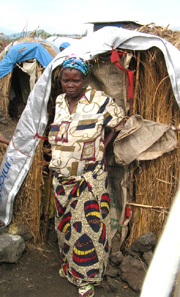GOMA, 9 January 2008 (IRIN) - Four days after the opening ceremony, a major conference aimed at restoring peace and stability in eastern Democratic Republic of Congo's (DRC) Kivu provinces finally got off the ground on 9 January at the University of the Great Lakes in Goma, with the region's humanitarian "catastrophe" topping the agenda. 
Photo: Noel E. King/IRIN 
One of the millions displaced by the fighting in the eastern DRC
Civil wars that plagued the country between 1996 and 2003 and continuing clashes in North and South Kivu have, according to the minister of social and humanitarian affairs, Jean-Claude Muyambo, led to the deaths of five million people, the internal displacement of six million, a third of them in the Kivus alone, and the rape of half a million women.
There are several parties to the fighting in North Kivu, including the regular army, dissident troops loyal to renegade general Laurent Nkunda, remnants of the Rwandan soldiers and militia that carried out much of the killing in that country's 1994 genocide and a variety of Congolese armed groups collectively known as Mayi Mayi.
Muyambo went on to accuse humanitarian NGOs of failing the affected people of the Kivus. "Many of their activities don't meet our expectations. When we need medical supplies, they bring us food," he said.
"The solution to this problem will arise from the establishment of laws that should define the role of government in humanitarian activity. NGOs should rather be behind the government which knows the needs of its people well," the minister added.
The conference chairman, Apollinaire Malumalu, who also heads the Independent Electoral Commission, remarked that the minister had failed to present the government's humanitarian action plan and called on him to do so before the end of the event.
The start of the government-organised meeting was delayed by logistical problems and rows over exactly who was eligible to attend, with some groups initially boycotting proceedings.
An original list of 300 delegates grew to more than 800, with an additional 500 attending as observers. As a result, the US$2 million budgeted for the conference will not suffice, according to organisers.
"Delegates will receive a per diem of $135 but they haven't got it yet because I think there is a liquidity problem," said a member of the organising committee.
Prime Minister Antoine Gizenga has called on all DRC citizens to contribute the equivalent of a dollar to meet the shortfall.
"It is going to cost a lot of money but peace has a price which we have to pay," National Assembly speaker Vital Kamerhe said.
"The blood of our brothers and our army is priceless," he added.
The conference is due to run until 17 January.
ei/aw/am/mw
Related articles
- • Felix Tshisekedi Sworn In as DR Congo President (January 24, 2019)
- • Felix Tshisekedi Elected DR Congo President (January 10, 2019)
- • Bemba, Katumbi renew their support for joint opposition presidential candidate Fayulu (November 16, 2018)
- • Vital Kamerhe also withdraws support for joint opposition presidential bid (November 12, 2018)
- • Oppositioin leaders pick Martin Fayulu as joint presidential candidate (November 11, 2018)
- • Jean-Pierre Bemba banned from running for president (August 25, 2018)
- • Vital Kamerhe named UNC presidential candidate (August 4, 2018)
- • No elections in DR Congo in December without electronic voting machines: INEC (February 13, 2018)
- • DR Congo Asks Rwanda to Turn Over M23 Rebel Leaders (July 26, 2013)
- • DR Congo, Rwanda Sign Pact to Fight Rebels in Eastern Congo (July 15, 2012)
- • Kagame Is A Problem for The U.S. and The U.K. (June 23, 2012)
- • UN Report Accuses Rwanda of Supporting Bosco Ntaganda Rebels (May 28, 2012)
- • Kabila, Army Chief of Staff head to eastern Congo to deal with defectors (April 10, 2012)
- • DR Congo Government Warns Bosco Ntaganda He May Face Justice (April 6, 2012)
- • Kabila's Party Loses Seats in Parliament, Increasing Reliance on Allies (February 3, 2012)
- • Tshisekedi Says He Won, Can He Prove It? (December 17, 2011)
- • Supreme Court Rules Joseph Kabila Won Presidential Election (December 16, 2011)
- • Supreme Court Hears Appeal on Presidential Election (December 15, 2011)
- • Joseph Kabila Wins Presidential Election (December 9, 2011)
- • Presidential Election Results Delayed 48 Hours (December 6, 2011)
- • Catholic Church Calls for Calm as Elections Results Are Published (December 4, 2011)
- • Kabila Leads Partial Election Results (December 3, 2011)
- • Vital Kamerhe Denies Calling for Elections to Be Annuled (December 1, 2011)
- • Congolese Start Voting in Landmark Elections (November 28, 2011)
- • 32 Million Congolese Voters Set to Elect Their Leaders (November 27, 2011)
- • Officials Cancel Final Campaign Rallies in Kinshasa after Clashes (November 26, 2011)
- • Candidates to Make Last Stand in Kinshasa before Monday's Election (November 26, 2011)
- • Campaigning in Eastern Congo, Kamerhe Vows To Restore State Authority (November 22, 2011)
- • Tshisekedi: UDPS Has Never Been for a Joint Opposition Candidacy (November 19, 2011)
- • Kamerhe Rejects Single Opposition Candidate Strategy (November 19, 2011)







